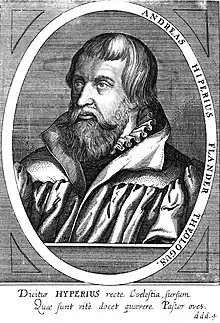Andreas Hyperius
Andreas Gerhard Hyperius (1511–1564), real name Andreas Gheeraerdts, was a Protestant theologian and Protestant reformer. He was Flemish, born at Ypres, which is signified by the name 'Hyperius'.

Life
He had a humanist education, and studied at Tournai and Paris.[1] He was resident in England from 1536 to 1540, and in 1542 was appointed professor of theology at Marburg.[2]
Work
Hyperius's theology lies between Lutheran and Reformed beliefs. Influenced by Martin Bucer, he was not a strict Lutheran.[1] Jean Calvin endorsed his erudition.[3] His work De formandis concionibus sacris (On the Making of Sacred Discourses) was the first Protestant text solely devoted to systematic homiletics, that is, to preaching considered as a branch of rhetoric.[4][5] The Methodus theologiae is a selection from, and method for reading, the Church Fathers.[6]
In his overall approach, Hyperius sought a firm basis in the Bible, rigidly, and held that before practical theology can be put in force, it must be made a part of systematic theological study, and must not be taught fragmentarily. Demanding an immense amount of preliminary reading on the part of the student, covering all practical theology except missions, he held that such reading would involve preparation for the practical work of the ministry. All must be squared with the Bible, or, where the Bible did not contain specific data, with the commandments of love for God and one's neighbor.
In addition, he urged the preparation of a work on church government, including the data of the New Testament, relevant portions of church history, excerpts from the councils, papal decrees, Church Fathers, and works on dogmatics, liturgics, and related materials.[7]
His English translator, John Ludham (vicar of Wethersfield, Essex, 1570-1613),[8] published the De formandis as The Practise of Preaching, otherwise called the Pathway to the Pulpet (London 1577).[9] Ludham went on to translate Hyperius's posthumously published De Sacrae Scripturae lectione ac meditatione quotidiana (Basle, 1569) as The Course of Christianity: or, as touching the dayly reading and meditation of the holy Scriptures (London 1579):[10] he then turned to the homilies of Rudolf Gwalther on the prophet Joel (London 1582)[11] before returning to Hyperius for A Speciall Treatise of Gods Providence (c. 1588), which included an exposition upon Psalm 107. To this was added an appendix of the Cambridge sermons and disquisitions of Peter Baro.[12]
Dietrich Bonhoeffer emphasised the role Hyperius had played in early Protestantism.[13]
Works
- De formandis concionibus sacris (1553, enlarged 1562)
- De theologo, seu de ratione studii theologici, libri IIII (1556)
- Elementa christianae religionis (1563)
- Methodi theologiae, sive praecipuorum christianae religionis locorum conmunium, libri tres (1568).
- De Sacrae Scripturae lectione ac meditatione quotidiana (1569).
Notes
- "Philip Schaff: Schaff-Herzog Encyclopedia Vol. : 0448=432 - Christian Classics Ethereal Library".
- Heinrich F. Plett, Rhetoric and Renaissance Culture (2004), p. 27.
- Christopher Mattinson Dent, Protestant Reformers in Elizabethan Oxford (1983), p. 90.
- Larissa Taylor, Preachers and People in the Reformations and Early Modern Period (2001), p. 51.
- "The Contribution of the Reformation to Preaching - by Carl C. Fickenscher II". Archived from the original on 2012-02-13. Retrieved 2008-11-06.
- Irena Backus, Historical Method and Confessional Identity in the Era of the Reformation (1378–1615) (2003), pp. 197–203.
- "Power, Frederick Dunglison".
- A. Hessayon and N. Keene, Scripture and Scholarship in Early Modern England (Ashgate Publishing, 2006), p. 63.
- Andreas Hyperius, The practise of preaching, otherwise called the Pathway to the pulpet: conteyning an excellent method how to frame divine sermons, & to interpret the holy Scriptures according to the capacitie of the vulgar people. First written in Latin by the learned pastor of Christes Church, D. Andreas Hyperius: and now lately (to the profit of the same Church) Englished by Iohn Ludham, vicar of Wethersfeld (Thomas East, London 1577).
- Andreas Hyperius, The course of Christianitie: or, As touching the dayly reading and meditation of the holy Scriptures: very requisite and necessary for all Christians of what estate or condition soeuer: two bookes. Translated out of Latine into English, by Iohn Ludham vicar of Wethersfeld (Henry Bynneman, London 1579).
- Rudolf Gwalther, The homilies or familiar sermons of M. Rodolph Gualther Tigurine vpon the prophet Ioel. Translated from Latine into Englishe, by Iohn Ludham vicar of Withersfielde (Thomas Dawson for William Ponsonnby, London 1582).
- Andreas Gerardus, Hyperius, A speciall Treatise of Gods Providence, and of comforts against all kinde of crosses & calamities to be fetched from the same. With an exposition of the 107 Psalme. Heerunto is added an appendix of certaine Sermons & Questions… as they were uttered and disputed ad Clerum in Cambridge. By P. Baro… Englished by I. L(udham), Vicar of Wethersfielde (John Wolfe [London, ?1588]).
- David L. Larsen, The Company of the Preachers: A History of Biblical Preaching from the Old Testament to the Modern Era: Volume 2 (1998), p. 803.
External links
- "Hyperius, Andreas Gerhard", Christian Cyclopedia, LCMS.
- Friedrich Wilhelm Bautz (1990). "Hyperius (eigentl. Gheeraerdts, Gerhard), Andreas". In Bautz, Friedrich Wilhelm (ed.). Biographisch-Bibliographisches Kirchenlexikon (BBKL) (in German). Vol. 2. Hamm: Bautz. cols. 1233–35. ISBN 3-88309-032-8.
![]() This article incorporates text from a publication now in the public domain: Jackson, Samuel Macauley, ed. (1914). New Schaff–Herzog Encyclopedia of Religious Knowledge (third ed.). London and New York: Funk and Wagnalls.
This article incorporates text from a publication now in the public domain: Jackson, Samuel Macauley, ed. (1914). New Schaff–Herzog Encyclopedia of Religious Knowledge (third ed.). London and New York: Funk and Wagnalls. {{cite encyclopedia}}: Missing or empty |title= (help)